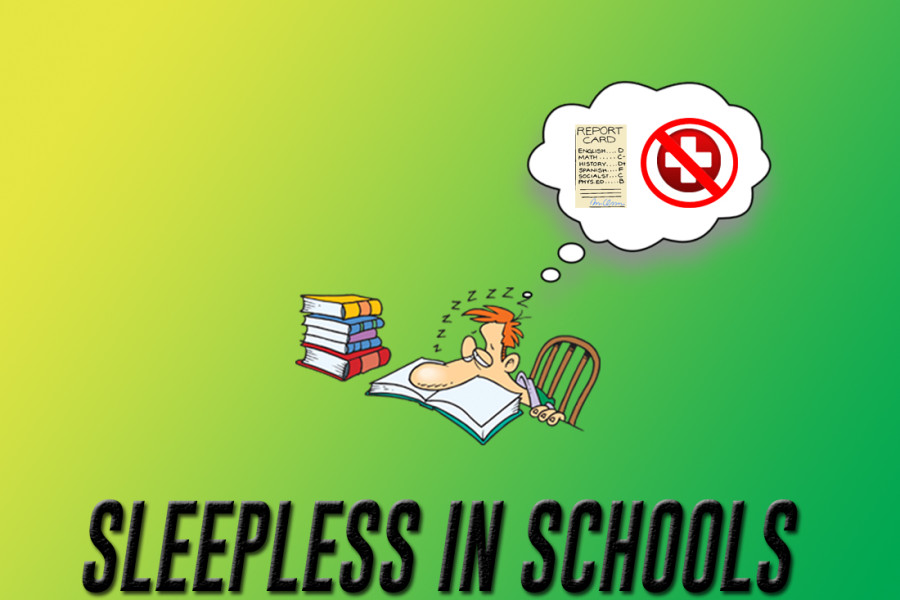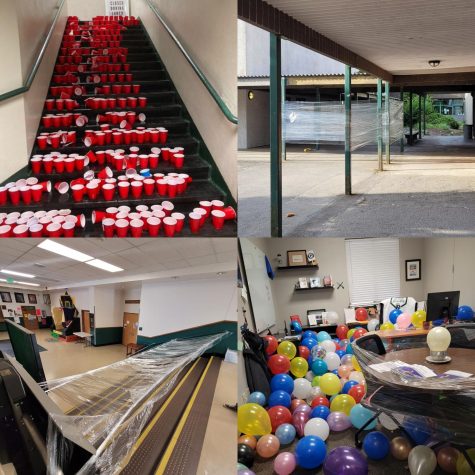Sleepless in Schools
Students are getting less and less sleep. Here is what guest reporter, Eric Wang has to say about it.
June 18, 2015
There are many adolescents who struggle to wake up for school every weekday. When it comes to the importance of sleep, it’s all about the biology. One of the biggest problems for American teenagers is that they rarely get an adequate amount of sleep. We want to get some sleep, and now doctors agree. According to the CDC Young Risk Behavior Survey in 2013, 69% of teens get fewer than eight and a half hours of sleep, and 40% get six or less. I, Eric Wang, hereby propose delaying start and end times for all schools in the Peninsula School District.
If we start high school later, academic performances will definitely improve. Students will be alert to what is being taught and they will be able to do their best when answering test questions. Sleep deprivation can be detrimental to students and schools because whatever grades students get will reflect school performance. Not only is loss of sleep causing an academic problem, but it is also a serious health concern. Teenagers who get less sleep are more likely to be depressed and have suicidal thoughts. When people suffer from depression, they get anxious and stressed, which can result in students being unmotivated for their studies. In a statement published in the journal Pediatrics, the Academy Adolescent of Sleep Working Group reviewed that inadequate sleep among teens can contribute to health issues such as obesity, diabetes, mood changes and behavior problems. Once people become obese, they have more trouble losing weight and keeping it off. The longer they are corpulent, the greater the risks of health problems like heart disease, stroke, and cancer.The Academy even analyzed studies that link poor sleep to increased reliance on substances like caffeine, tobacco and alcohol. It also examined how sleep deprivation impacts school performance.
Fatigue is responsible for one in five auto deaths in the USA. Young adults, especially males, already pose a risk to the road when they start to drive. Thus, fatigue among youths is jeopardizing the safety of the road even more than usual. One fatality is one too many. According to the NHTSA (National Highway Traffic Safety Administration), anyone can pose a high risk to the road during drowsy driving. A Wyoming High School that shifted its start time to 8:55AM showed that car accidents drop by seventy percent due to students’ increased alertness and reaction times.
Many people suggest that teens should go to bed early. This actually proves to be a challenge to them. Teenagers have reported that if they hit the sheets in advance, they end up staring at the ceiling. Once they hit puberty, their sleep cycle changes. Adolescents naturally stay up and wake up later than young children and adults do because of how their bodies release melatonin, a hormone that controls your sleep and wake cycles. “The evidence is clearly mounting both in terms of understanding the repercussions that chronic sleep loss has on the health, safety and performance of adolescents, and there is also really solid compelling data supporting the fact that delaying school start times is a very important intervention that can mitigate some of the impact of sleep loss,” stated Dr. Judith Owens, director of sleep medicine at Children’s National Medical Center.
Youths aged six to eleven go to sleep around 8-9PM and wake up around 6:30-7:30AM, which carries their needs of ten-eleven hours. Since an adolescent’s sleep clocks get biologically delayed, they stay up until 11PM and wake up at 8AM, which carries their required amount of sleep. After sunrise, artificial light is still not needed to conduct human activities due to civil twilight. At the earliest time of the year, it normally ends at 4:55 PM. This means that there will be time for these kids to get home safely before dusk. The American Academy of Pediatrics issued a detailed statement in August arguing that a typical adolescent should be expected to sleep from about 11PM to about 8AM, and calling for secondary schools to start no sooner than 8:30 a.m. Summarizing the research on sleep among the young, the Academy noted that when schools have delayed start times, the number of car crashes involving adolescents decreases sharply. Other work points to a small but significant effect on academic performance, and researchers also believe that lack of sleep can lead to obesity and depression in some young people. Sleep deprivation can cause grievous corollaries to our health and safety. If the High School decides to push back start times by at least thirty minutes, it can behoove students by helping them to stay on alert and have a positive attitude. There is strong scientific evidence to support later start times for High Schools in the US.












